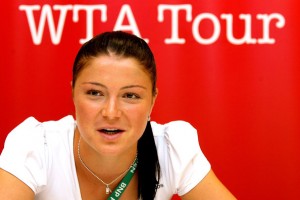By David Kane
This week, social media forums were (pardon the pun) “a’twitter” with a certain catchphrase coined by WTA No. 3 Serena Williams back in 2009 — one of which I was certain I’d never hear again: “She won Rome and Madrid.”
Why the sudden resurrection of the past? The dig, of course, was aimed at former world No. 1 Dinara Safina. At the 2009 Wimbledon Championships, the Russian had been demolished by Serena’s sister Venus, who was in turn taken out by Serena in the finals. Serena was left reflecting on the apparent improbability that she hold three of four major titles and be ranked No. 2, while the Slamless Safina remained No. 1.
Serena Williams’ statement in 2009 ridiculing Dinara Safina’s ranking of world No. 1 given that Dinara only ‘won Rome and Madrid’ but not any Slams (skip to the 1:30 mark):
Why was yesterday’s news drudged up in an arena where news is more often shattered than broken? Because the Russian sister of former No. 1 Marat Safin piped up from relative obscurity to take a long-overdue shot at a woman who at one time led the chorus of criticism against her.
For whatever reason, a member of the Russian media asked Safina if the current No. 1 Victoria Azarenka deserved her spot despite a paltry resume against Williams, the Wimbledon, Olympic and US Open champion. Replied with what I imagine to be her shoulder-shrugged matter-of-factness, “the No. 1 is not the tennis player who selectively plays major tournaments, even winning them, but the one who is stable over the full season… Let the younger Williams play a full season, and then we’ll see who will be the No. 1.”

Journalists and fans alike took umbrage with such a statement, and were quick to resort to the aforementioned below-the-belt dig Serena once used. In a way, they have a point. When Safina was No. 1, Serena was constantly exclaiming to all who would listen that it was she who deserved the top spot, and that Safina’s ranking was in name only. Yet this time around, Serena has been silent on the issue of ranking. In fact, Serena seems satisfied with capping her year at the US Open, and may only return to the Year-End Championships in Istanbul if she plans a final tournament of 2012 at all. So it is not Serena I find at fault here.
Instead, I take issue with those who thought Dinara was better off saying nothing, that she bears no relevance to the women’s game now (if ever). Like it or not, Dinara Safina was one of the best players in the world between 2008 and 2009, and came painfully close on more than one occasion to winning the Slam title missing from her otherwise illustrious resume. All the while, she was hounded by the media for her place in the world, enough to make any human being doubt themselves if they didn’t already. If anyone has the right to defend a beleaguered No. 1, it’s Dinara.
Finally, barring some off-the-wall offensive remark, do any of us feel comfortable throwing dirt at a person who wanted to prove everyone wrong that she broke her body trying? Someone who made up for a lack of natural talent with determination and desire, only to see their dreams dashed away by an ostensibly career-ending injury? Despite many who said she was bad for the sport, any person who loved tennis as much as Dinara would have only helped it grow. Maybe if we had only given her time, she could have.
